
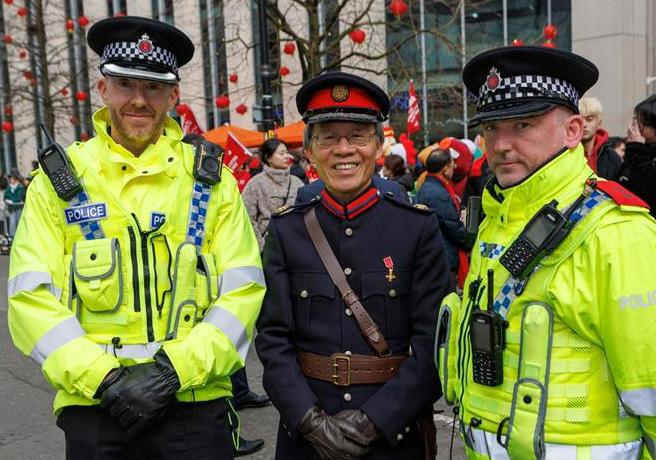









This month, there is a focus on our Major Investigation Teams (MIT).
I have a good appreciation of the support that MIT gives to districts, having worked there as a DI.
On a district the size of the CoM, we see a number of serious incidents each year; from murder to firearms discharges to serious sexual offences. The support of MIT to progress these is key in bringing to justice those who cause the greatest harm to our communities.
These investigations can require a great deal of resources and analysis which MIT are able to provide and see investigations through to their conclusion.
Sometimes, this support is assisting the district with staff and other times it involves taking the whole investigation into a MIT syndicate.
I am really grateful for all of the support we get from our colleagues in MIT and the work they do on investigations across our district undoubtedly assists in bring offenders to justice and making our communities safer.
A very warm welcome to Superintendent Gayle Brister and Detective Superintendent Toby Facey who have recently joined the CoM, I would also like to thank Detective Superintendent David Moores and Superintendent Richard McNamara who are moving on to other roles outside of the district and wish them well.
Chief Superintendent David Meeney
Every day officers are working tirelessly to fight, prevent and reduce crime, keep people safe and care for victims.
Putting a case together can take many officers and members of staff from different departments working for days, weeks, months or even years to bring offenders to justice whilst supporting victims every step of the way.
One such example of this was a case City of Manchester Criminal Investigation Department (CID) has recently seen at court which saw a brazen individual sentenced to over four years in custody after targeting lone women in and around Mancunian Way.
In December 2023, officers identified an emerging series of indecent exposure and sexual offences that occurred near to the underpass area of the Mancunian Way, an area heavily populated and used by both commuters to the city and the student community in Manchester to travel to and from the University area.
This series caused significant concern and safeguarding risks due to the escalation in offending and the targeting of lone females in the area.
Detective Constable Tamsyn Muller took ownership of this linked series, with the assistance of colleagues in Longsight CID and Serious Crime Division Visual Evidence Retrieval and Analysis (VERA)
unit. Following a painstaking, meticulous investigation including a significant trawl through hours of CCTV, evidence was identified showing the suspect using bus travel from Wythenshawe to the scene and leaving promptly after each offence.
Despite a lack of forensic evidence, a suspect was identified as Robert Emmerson following a press release of his image caught on CCTV.
Emmerson was swiftly arrested and significant evidence including the distinctive jacket he wore during the offences was recovered. Through diligent research DC Muller also identified several other offences that had occurred on other districts.
He was subsequently charged and remanded in custody in relation to all matters, however maintained a ‘not guilty’ plea through trial.
Each one of the victims demonstrated immense courage and bravery giving evidence during the trial, leading to Emmerson being found guilty of five counts of sexual assault by touching, and seven counts of indecent exposure.
He was sentenced to four years, six months in custody alongside a lifelong Sex Offenders Registration requirement and a lifelong Sexual Harm Prevention Order (SHPO) being granted.
A great result for CoM district taking a dangerous offender off the streets.
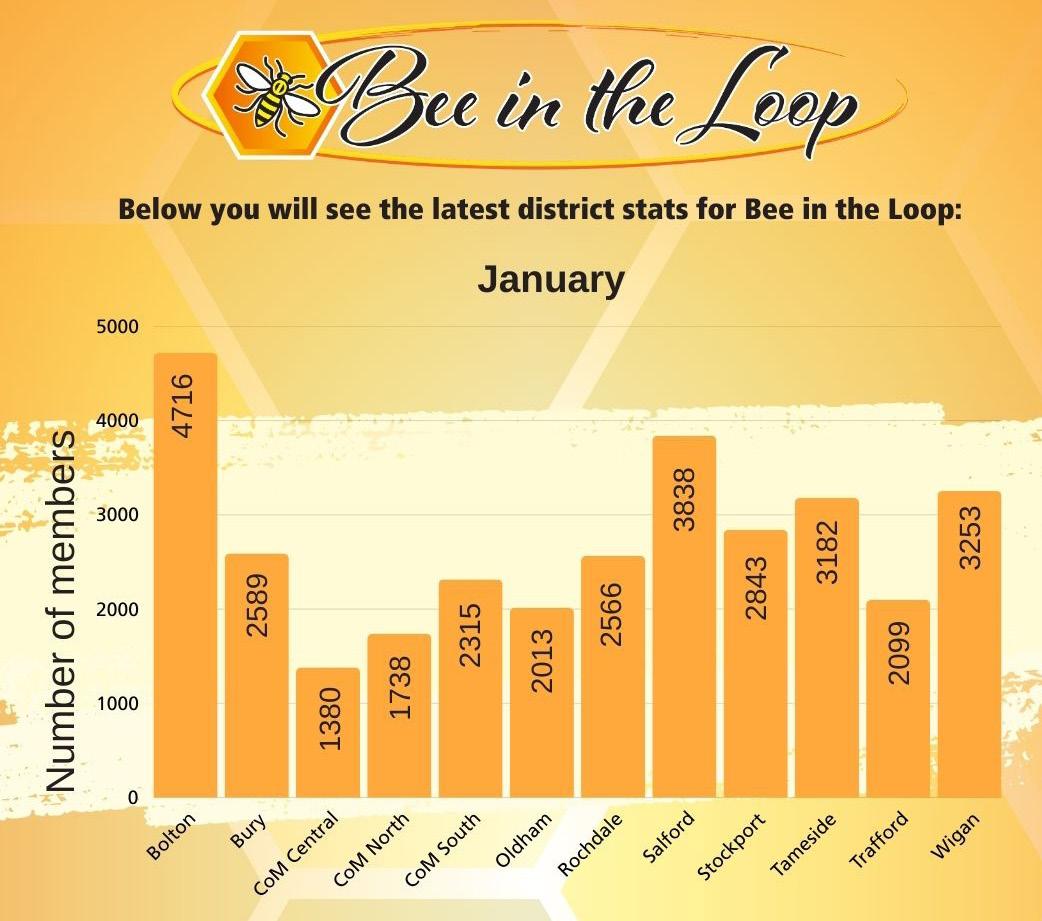
The BBC joined us in the city centre one evening in January, to see how GMP and the hospitality industry are safeguarding young people through increased engagement, education and test purchasing.
Over the course of the evening, we conducted several test purchases at various hotels across the city centre to see how they handled situations of potential exploitation in their hotel. Using a plain clothes officer as a suspect and a volunteer posing as an underage victim, we attempted to book a hotel room to see if the staff could spot signs of child sexual exploitation and take action to safeguard young people.
Overall, we could see that the majority of hotels had a good understanding of child exploitation, as a result of Operation Makesafe training; they challenged the test purchasers and refused to sell them a room before calling the police to report their concerns.
In one instance, employees failed to challenge the test purchasers or report suspicious activity to the police. A full debrief was conducted after this, and further training will be required to help them identify signs of child exploitation and understand the impact that allowing people to book a hotel room in suspicious circumstances can have.
The aim of the operation is to empower hoteliers and employees to feel confident in spotting the signs of potential exploitation happening in front of them and reporting it to the police so that we can act. These operations also help us to understand where there are gaps in the knowledge and training of hotel staff so that we can address these to ensure young people are kept as safe as possible.
Chief Superintendent David Meeney, District Commander for Manchester, said: “It is vital that we raise awareness amongst key local businesses as well as members of the public so they
can learn what to look out for, spot the signs, and ultimately help safeguard young people. Sometimes there may be a perfectly innocent explanation for a situation, but if we can protect even one vulnerable young person from harm, this initiative will have been worthwhile.”
Indicators of child sexual exploitation within the hospitality sector include, but are not limited to:
• Adults who appear secretive about their visit or try to conceal that they are visiting in the company of a child or young person.
• Arrival of young person with a boyfriend/girlfriend who appears older than they are.
• Refusal to provide identification or credit card details and attempting to pay in cash.
• Requesting an isolated room, a room close to a fire exit or a room with easy access to the car park.
• High levels of visitors to a guest room.
• Visitors arriving and asking for a specific room number without knowing the name the room is booked under.
• Refusal to have room cleaned or visited.
• Pre-paid bar tab or consumption of pornographic film channels in a room occupied by a child or young person.

As part of our ongoing drive to improve the way we engage with vulnerable victims and witnesses, including children, GMP will shortly launch a new process for arranging and conducting video interviews with children and vulnerable adults.
Ahead of the rollout of the new process, training sessions will be provided for anyone whose role involves dealing with victims and witnesses, including response, DIT, CID and CPIU.
The training will take place between Monday 10 and Friday 14 February, with sessions on each day from 10am to 11am and from 2pm to 3pm.
Each session will take around an hour, with training followed by a Q and A; the training will count towards continuous professional development (CPD) hours for detectives.
You can view a full list of links to each training session by scanning the QR code below.


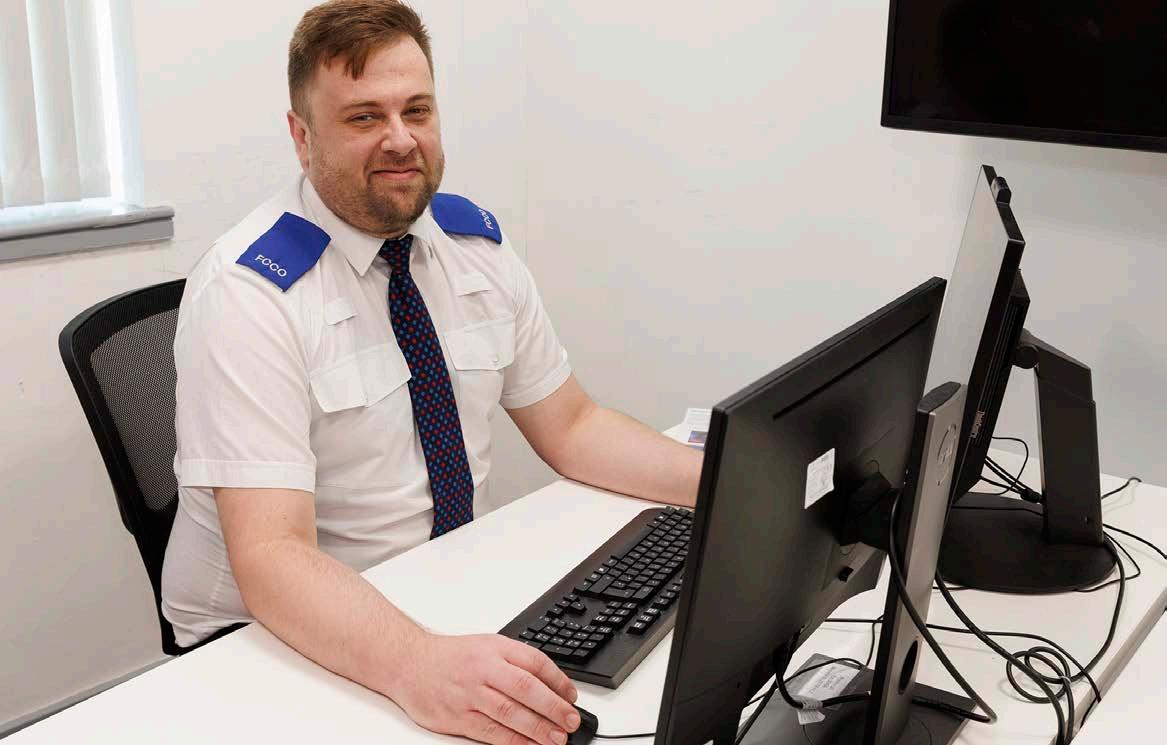
As Right Care, Right Person (RCRP) moves into its second wave, we spoke with Bradley Sone, a call handler at Claytonbrook FCCO, about the implementation of the initiative and its progress so far.
How do you feel about RCRP so far?
So far the introduction of RCRP in GMP has had a huge impact. There was a lot of worrying prior to launch, but the whole team seems to be on board now making sure the callers are directed to the most appropriate agency to help them. As a force we have had a drop in deployments to concern for welfare calls, freeing up patrols to go to other incidents; there has also been a drop in the number of concern for welfare jobs received from partner agencies, which are now more likely to contact the more appropriate agency as their first point of call.
What aspects have been positive for you?
For me the most positive aspect of RCRP is getting the caller the help they need. For so long the police have attended everything to try and help as best they can, but with this new process now in place the people of Greater Manchester can get the right help that they need.
What challenges have you encountered with RCRP since it was implemented?
My team specifically struggled with the changes to the missing persons policy [Operation Addition] rather than RCRP itself –they were both big changes to two big parts of call handling, and the missing policy change seemed to not be shouted about as much.
How did you overcome these challenges? Who or what helped you?
We communicated any challenges we encountered to the RCRP senior leadership team (SLT) and the subject matter experts (SMEs) in the room, who made amendments to the policy where appropriate and communicated changes so the new information could be filtered down. Throughout the whole implementation of RCRP there has been a lot of help and support available from the SLT and the SMEs.
How do you think the public feels about RCRP?
Members of the general public who I have spoken to or assisted with jobs all seemed happy with the change; a lot of the time on calls I have found that people were just unaware of who else they could call so they called the police, but when we pass on advice for who else to contact, they are happy to follow it.
What do you hope to gain from RCRP in the future?
By continuing with RCRP, we can continue to get the people of Greater Manchester the right help. As a result of fewer deployments for concern for welfare calls, we can attend more jobs in a given timeframe.
Are there any specific improvements or outcomes you are looking forward to?
The policy continues to be updated as we continue working with RCRP. The changes so far have all been appropriate, they haven’t added any extra work to the control room, and the room as a whole is more confident with RCRP. I cannot think of any specific improvements needed at this time.
GMP’s Association of Women in Policing (AWP) will be holding an International Women’s Day event on Friday 7 March 2025 at GMP Force Headquarters.
The event, which will take place in room 515 of FHQ from 9am to 3pm, will be opened by ACC Steph Parker and feature presentations from:
• Police History Society chair and former senior Metropolitan Police officer Kate Halpin QPM on the diverse history of women in policing
• Renowned academic Dr Sajjan Gohel on the role of misogyny in the ideologies that drive terrorism
• GMP Det Insp Hayley Riley and Ch Supt Colin McFarlane on the importance of workplace mentoring and female representation at the board level
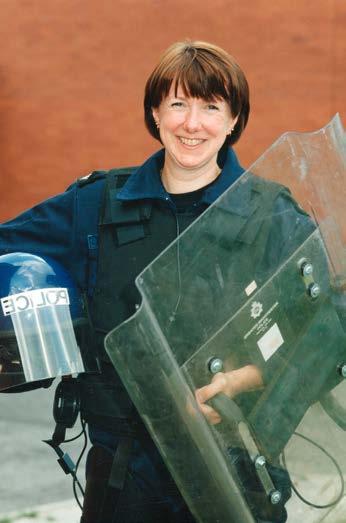
• GMP leadership trainer Rebekah Renshaw on professional development within policing
• Ruth O’Malley, head of data science at Counter-Terrorism Policing, on the value of police staff in complex investigations
Attendees will be able to visit stalls for support networks and bodies both within and outside GMP, and network with female colleagues from across the force. Food will be provided, with vegan and halal options available.
If you’re interested in attending the event, please email AWP@gmp.police. uk with your rank and division.
There are only 50 places available at the event, so get in touch as soon as you can!
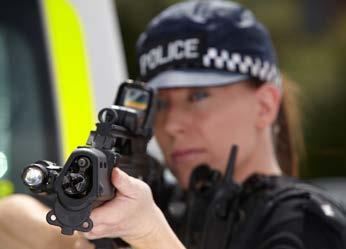

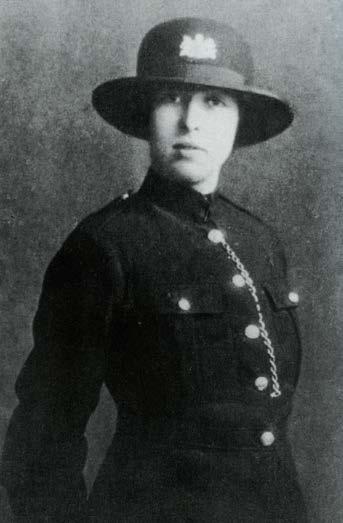
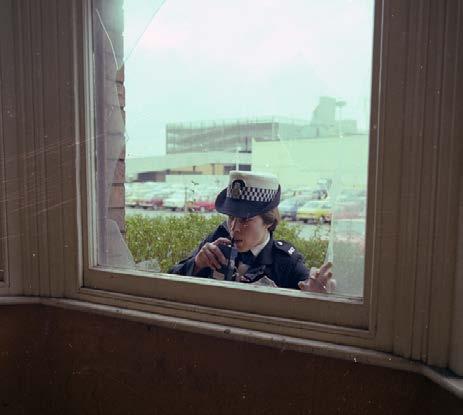

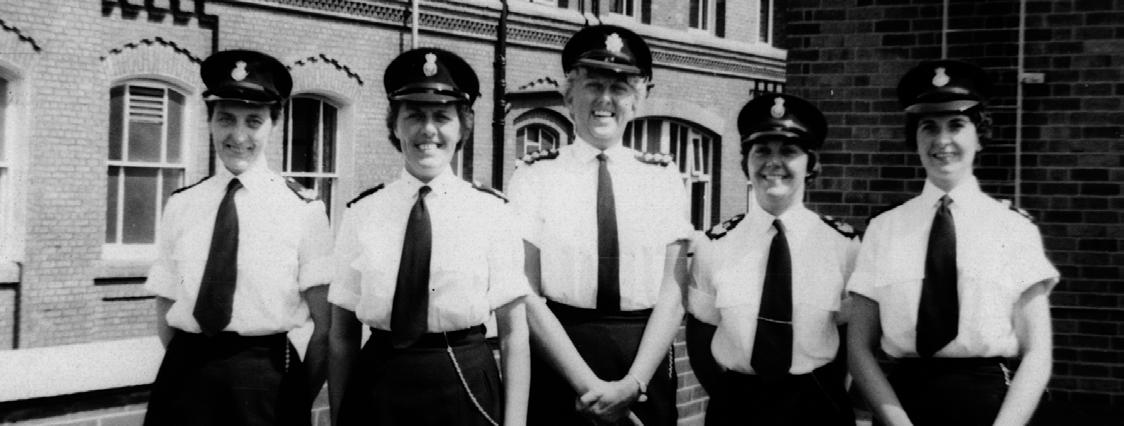
A new statutory Victims’ Code is now in effect, placing mandatory requirements on all police forces and criminal justice partners to provide consistent, high-quality support to victims throughout their journey through the criminal justice system.
In order to help embed the Code into GMP practice at all levels, for both police officers and staff, ACC John Webster (Criminal Justice and Custody) and Victims’ Services strategic lead Louise Sever have put together a video that provides a high-level overview of what the changes mean for us as a force
ACC Webster said: “These changes represent a major step forward in how we support victims of crime.
“The new Code puts clear obligations on us to provide better information, support and communication to victims, while working more closely with our partner agencies.
“Every contact with a victim is an
opportunity to build trust and confidence in policing.
“These new requirements will help ensure we provide consistent, professional support to every victim we encounter.
“Remember, supporting victims effectively isn’t just about following a code – it’s about providing the professional, empathetic service that victims deserve and that builds public confidence in policing.”
Key changes which officers and staff should be aware of include:
• A broader definition of ‘victim’ that includes those who have witnessed crime, those whose birth resulted from criminal conduct, those who have lost a close family member to crime, and children who are victims of domestic abuse.
• Mandatory compliance with the Victims’ Code, requiring us to provide specific services unless there are good reasons not to.
• New requirements to collect and share data about victim services with other criminal justice agencies.
• Specific obligations around notifying schools when we believe a child may be a victim of domestic abuse.
• Enhanced information sharing framework with clear guidelines on handling victim information.
You can view the video by scanning the QR code below.

The post-incident procedure (PIP) is a national process designed to guide GMP officers and staff who have witnessed or been involved with a death or serious injury (DSI) of persons following police intervention or contact, where there is no suggestion of misconduct or wrongdoing on behalf of the GMP employees involved.
The procedure is in place both to enable officers and staff to provide any independent inquiry with the best evidence that they can and to ensure that the welfare of any GMP officers or staff members involved in an incident of this kind is prioritised at all stages of the process. It has welfare at its core and offers an element of protection
to officers who have often acted with nothing but courage and professionalism in extremely challenging circumstance.
All GMP officers and staff should ensure they are aware of the PIP and how it works – DSI incidents could affect anyone, public-facing or otherwise, and irrespective of their role or rank.
Our Creative Media Imaging team has produced an informative video covering the key aspects of the PIP, to give you an element of confidence in the process in case you are ever involved in an incident in which a member of the public has either been killed or seriously injured.
You can watch it by scanning the QR code to the right.
Please be aware that the video contains graphic footage which some viewers may find upsetting or distressing.


The latest season of Channel 4’s behind-the-scenes documentary series Manhunt, which aired through January, focuses on teams at GMP as they investigate a series of cases.
The programme, which has been described as ‘absorbing…a low-key tribute to diligent police work’ by the i and ‘gripping’ by the Daily Mail, follows the progress of Operations Feverfew (investigating the February 2022 kidnap and murder of Christopher Hughes), Southsea (the hunt for the killers of Neri Morse, who was stabbed in Ancoats in November 2022) and Bure, which sees officers respond to intelligence that a man is planning to attend a large public event with a gun.
Op Feverfew, the subject of the first


episode of the series, is the complex investigation into the kidnap and murder of Christopher Hughes in February 2022. The documentary crew follows the work of DI Justin Bryant and his team at GMP’s Serious and Organised Crime Group following an initial 999 call reporting a man being forced into a car in Wigan, as they piece together evidence and deploy resources to locate Christopher and his abductors. Once a body is found, the missing persons case becomes a murder investigation; and the team must uncover what happened –and why.
The second episode follows Operation Southsea, which sees the Major Incident Team spring into action when a stabbing on a busy street in broad daylight leaves
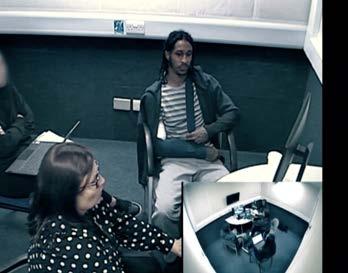

24-year-old Neri Morse dead and three suspects nowhere to be found. The team calls in specialist intelligence officers to track the fugitives before they strike again.
The third and final episode focuses on Operation Bure, an investigation into intelligence that a man was planning to attend an event with a gun. In the space of only a few hours, officers must respond proactively and dynamically to locate the potential offender and mitigate any threat he poses to the public.
Every episode of Manhunt is now available to stream at https://www. channel4.com/programmes/manhuntdocumentary.


GMP’s ongoing evidential property management (EPM) streamlining project was introduced to support with the reduction of serious risks to the retention and accessibility of evidential property across the force. One key area of focus is the significant volumes of destruction backlogs being held across the force, with around 44,000 evidential holdings currently awaiting further action or disposal. Backlogs like this significantly increase the risk to GMP, and therefore a key focus has been placed on streamlining and stabilising the EPM stores and their content.
Under the EPM ‘streamline and sustainability’ plan, a performance dashboard was created to support with the identification of high risk and priority areas within the evidence property management system, ensuring that the project team was dealing professionally


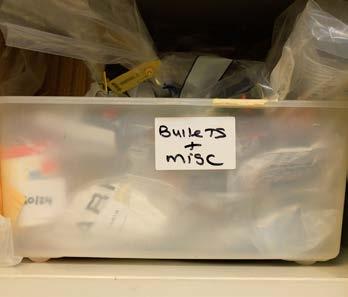
with the management of evidence, to safeguard its integrity in support of the prevention, reduction and detection of crime, keeping people safe, and caring for victims. Weekly SPOC meetings were introduced to share challenges, review ideas and ensure urgent actions were reviewed regularly.
These initial solutions will now be followed by a series of localised days of action, which will see some evidence storage facilities temporarily close for a few days to allow the project team, EPM store staff and divisional officers work collaboratively to reduce existing backlogs. On the first of these, a ‘proof of concept’ session at Oldham which began on Monday 27 January, the team was able to reduce the current backlogs from 3,595 destruction items to 633 over a three-day period.
Senior Change Project Manager Lisa Semple, who is overseeing the project,

said: “We’re already very pleased with these initial results, and we’re looking forward to further successes throughout the first half of 2025.
“The Oldham day of action follows on from a series of SPOC-led actions in 2024 which saw reductions in disposals of 60% at Longsight; 55% at West Didsbury; 47% reduction at Oldham and 43% at Wigan. Our overarching goal is to reduce the 44,000 holdings down to around 9,000 items.”
The days of action will be complemented by the introduction of proactive stock management practices aimed at preventing backlogs from building up again, including the introduction of standard operating procedures, store targets, daily performance meetings and a weekly Gold meeting to track store performance and identify early on any challenges which may pose a risk to backlog volumes.
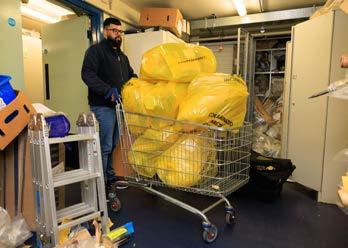
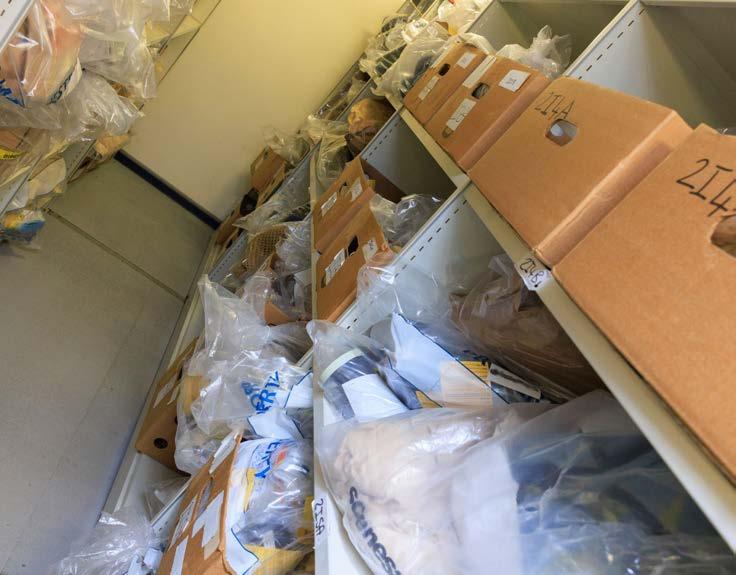

In late January, a GMP officer was seriously injured when a vehicle hit her at speed while she was investigating to a report of suspicious behaviour in Cheadle. A man has been arrested on suspicion of attempted murder.
Ch Insp John Picton of the Stockport district said: “This incident is truly shocking and shows how quickly situations our frontline officers attend can escalate. Our officers go to work every day to provide an outstanding service to the communities they serve, and achieve fantastic results in situations that are often challenging. Our investigation is continuing and the officer is being supported by all of us at the Stockport district; she is recovering well.”
From September 2018 to September 2023, the number of assaults on police constables in England and Wales rose from 28,668 to 42,424 incidents: an increase of 48 per cent. In the same period, assaults on officers resulting in injury increased by 14.8 per cent.
It’s important to remember that any assault or hate crime that happens to you while you are on duty is a serious matter. Being assaulted or abused at work is not normal; it’s not acceptable; and it is absolutely not just ‘part of the job’. Oscar Kilo’s Operation Hampshire aims to prioritise officer and staff wellbeing by ensuring that officers and staff who have been attacked are
taken seriously as victims and that the impact of every assault is considered, regardless of injury. It provides guidance, strategy and resources both for officers and staff who have been attacked while working, and for their supervisors and line managers.
Sometimes when we experience a traumatic event – such as being assaulted or subjected to a hate crime –the full impact of what has happened doesn’t hit us until days or weeks afterwards. The psychological effects of being attacked at work are often more insidious, and can last far longer, than the physical injuries. Different people experience and respond to trauma in very different ways and with varying levels of resilience, formed by their own individual experiences; and there is no right or wrong way to experience trauma.
GMP recognises that the wellbeing of our officers and staff is paramount to maintaining a strong, effective police force, and we want to ensure that every officer or member of staff who is attacked while at work is treated like any other victim of a crime – that they have meaningful support, regular contact from the team investigating their case, and that the support that they receive has oversight at a senior level. Operation Hampshire is a national initiative offering the necessary strategy and guidance to help forces respond effectively to assaults on police officers
and staff, enabling us to get the basics right for our colleagues when they need us most.
At the heart of Operation Hampshire is a seven-point charter that continues to guide our approach:
1. Assaults on police officers and staff should be investigated with the same care, compassion and commitment as an assault on a member of the public.
2. The Victims’ Code of Practice (VCoP) applies to all victims of crime, including police officers and staff.
3. The assaulted officer must never be the officer in charge (OIC) for the investigation into their own assault.
4. Victims recover better and more quickly if they receive appropriate support.
5. The supervisor must ensure that the district commander or head of department is informed to provide continuity of welfare support.
6. The victim of the assault and/or the line manager should ensure that Form 700B is completed as soon as possible after the event and sent to the Health and Safety Unit.
7. To achieve a successful prosecution, the best evidence should be provided.
You can learn more about Op Hampshire, including information and resources for victims of crime, their supervisors and SLTs, on our dedicated intranet hub at Home > Operational support > Operation Hampshire.
On 25 November 2024 Kathleen Cotton, widow of former GMP sergeant Alan Cotton, celebrated her 100th birthday. To celebrate the occasion, Kathleen was visited by chair of the Manchester branch of the National Association of Retired Police Officers (NARPO) Sandie Wilde and treasurer Maureen Graham, with flowers and a gift; as well as CoM Supt Simon Nasim, who brought a personally written card from GMP Chief Constable Stephen Watson QPM, who was unable to attend.
Sandie said: “Kathleen is still very active. She was a teacher at a local primary school, and while out and about she is still approached by former pupils who have now retired!”
Sgt Cotton, who served with GMP from around 1950 to around 1980 before going on to work in Eccles courts, is well remembered as a great character. During his policing career, he was the recipient of a bravery award for rescuing a man from one of the highest buildings in the city.
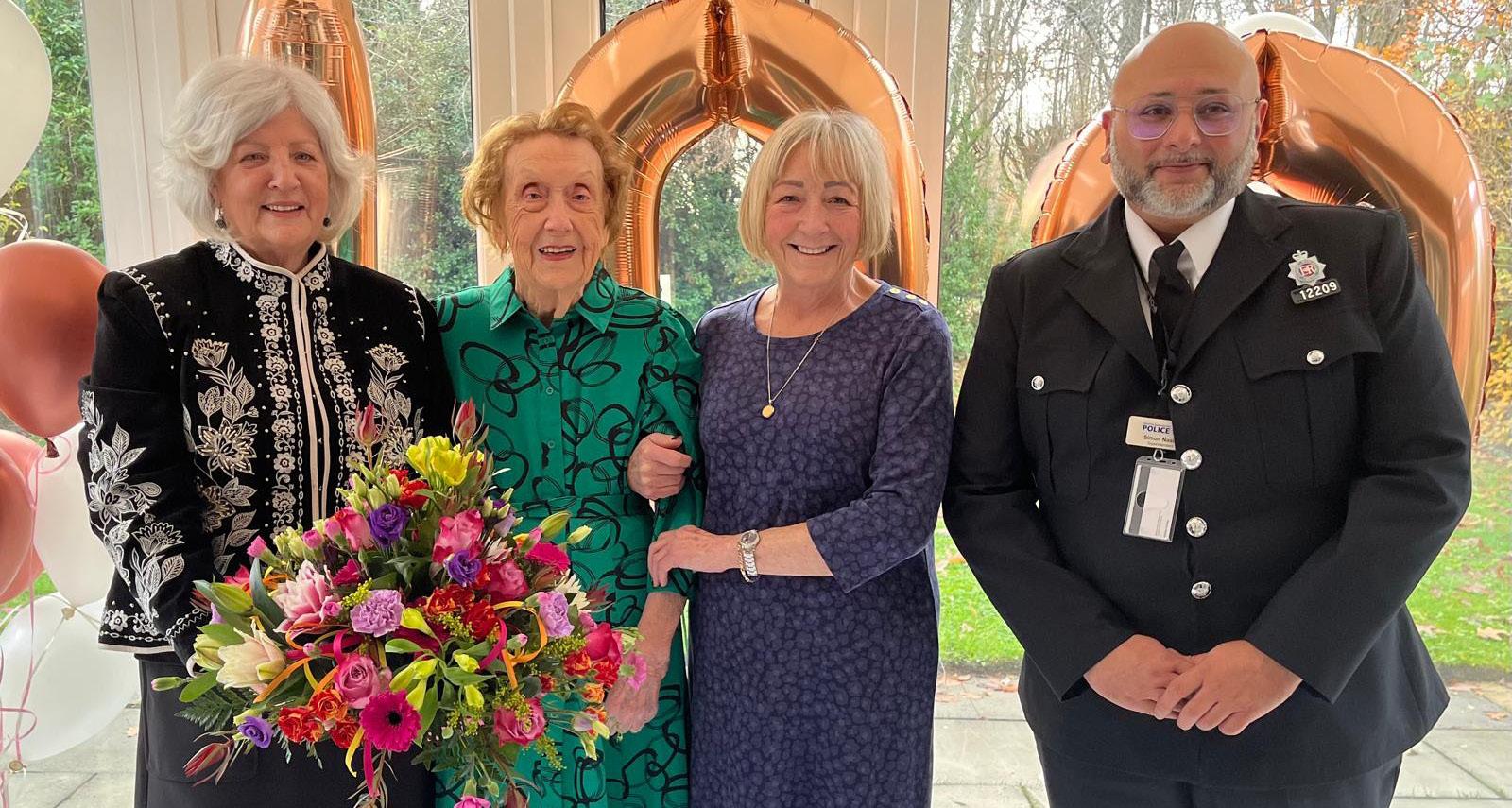


On Sunday 2 February 2025, people took to Manchester’s China Town to celebrate with famous red lanterns hung from the trees and the muchloved legendary Dragon Parade. As usual, GMP officers were on hand to help ensure the celebrations went smoothly.

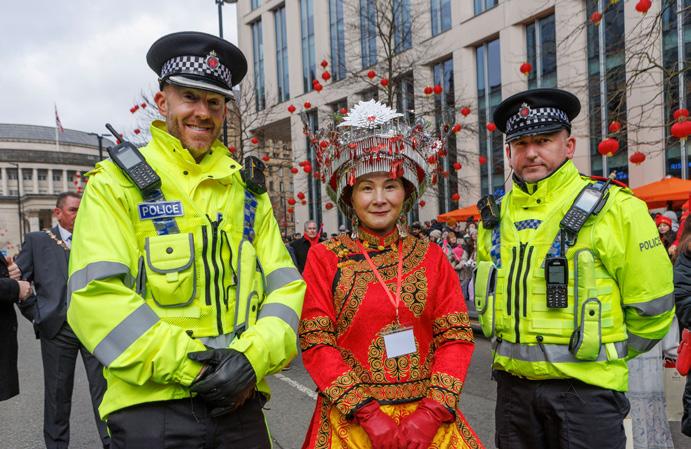
In the city centre, officers supported the parade and managed the huge crowds which had turned up to see the dragons. They also had a reassuring presence, helping people navigate through the city.
This year, Chinese New Year fell on Wednesday 29 January 2025, and marked the start of the Year of the Snake.
The celebration lasts for 15 days, starting from the first day of the lunar month and ending with the Lantern Festival on the final day.
Each Chinese New Year is characterised by one of 12 animals that appear in the Chinese zodiac each with its own characteristics and significance.
This year is the Year of the Snake, representing wisdom, charm, elegance, and transformation
In Chinese culture, the snake is a symbol of happiness and good luck, with people born in the year of the snake said to be wise and charming.

During February 2025, a national firearms amnesty for Turkish manufactured Top-Venting Blank Firers (TVBF) took place.
Although these firearms may have been lawfully purchased originally, they are now illegal under the Firearms Act 1968.
People can hand these into stations across Greater Manchester, and if done during the above period will not result in criminal prosecution.
However, after the amnesty period, anyone found to be in possession of a TVBF could face prosecution and to up to 10 years’ imprisonment. What is a TVBF?
TVBFs are guns designed to fire blank cartridges only, featuring a fully blocked barrel.
In the UK, these weapons could previously be owned without a licence unless classified as ‘readily convertible.’
However, recent findings indicate a rising connection between these firearms and criminal activities, such as intimidation and mimicking genuine handguns.
Over 10,000 TVBFs are estimated to be in circulation in the UK, and have been used in several serious, criminal
incidents, including four murders.
The models that people are being asked to hand over are top-venting blank firers manufactured by any of the following:
• BLOW
• CEONIC
• EKOL
• RETAY
Other firearms can be surrendered during this period, as can all brands of blank firers, converted or otherwise.
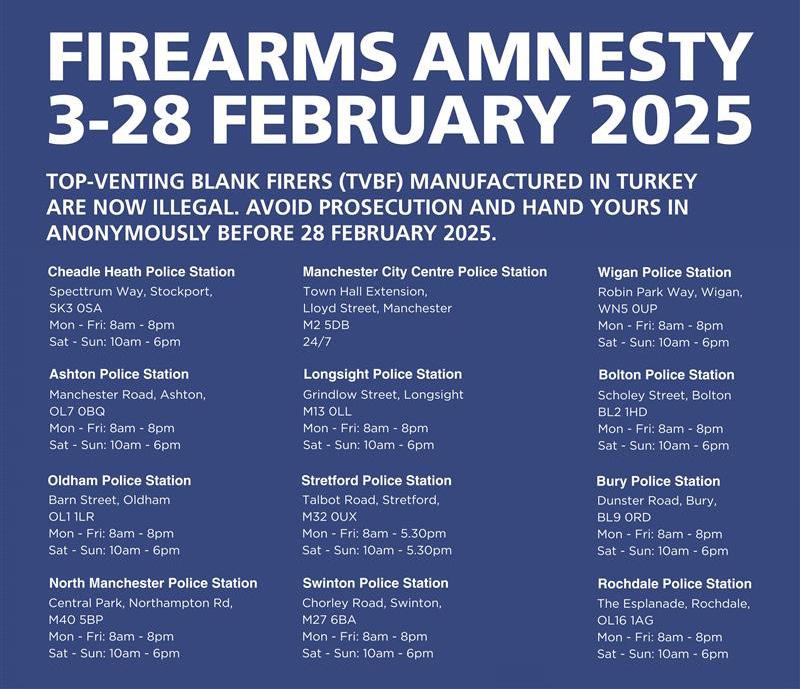
It has been proven that businesses that truly champion mental health and staff wellbeing not only will be able to attract and retain talent, but will also get the best out of people, which will benefit both individuals and the organisation.
In relation to this, promoting and supporting staff wellbeing is at the heart of GMP’s purpose, with initiatives such as access clinicians at our occupational health unit, and wellbeing support networks which include a Wellbeing Resilience Coach (WRC) and Peer Supporters (PSN).
One of the initiatives operating across all districts is the GMP’s Sports and Social Club. As members of the GMP family, all employees have the chance to join their divisional club for a small monthly fee. Members can take advantage of a range of activities, join GMP sports sections and access to their divisional gyms (an additional yearly subscription of £30 is taken for this to allow access to all three gyms on the CoM: this ensures the equipment is refreshed and current)
The club in the CoM district (North, Central and South) is led by Rachel Devalle, who has been overseeing the programme in the City of Manchester for the last four years. She works alongside Kez Smith on the project. Every month, a newsletter is sent to the current members with information about the latest activities and offers that
members can use to unwind after the daily demands of policing.
The main aim of these offers and advantages is to have positive impact on wellbeing and mental health. They are of a varied nature, which include (but not limited to):
-Days out (discounted theatre and cinema tickets, outdoor activities)
-Taster experiences
-Health and beauty treatments (sports therapy)
- Help with your home (renovation services from trusted builders, gas engineers and kitchen fitters - all who have been used in our own homes).
Furthermore, caterers travel across the three main locations, Central Park (Divisional HQs), Longsight and West Didsbury once a month and offer the club members delicious meals such as Italian pasta, breakfasts or ice cream free of charge to members of the social club.
Monthly raffles are carried out where members can win a selection of prizes such as M&S vouchers, cinema vouchers or cash among others. Members automatically enter the monthly raffles when joining the club.
The CoM club also subsidises theatre tickets for the Palace, Opera House and The Lowry These are advertised regularly and are extremely popular.
The club has been widely praised by its members, who send positive feedback regularly to Rachel and Kez. One member expressed “a massive
thank you for all the thought, effort and time you are putting into the Sports and Social: it is making a huge difference.”
A second shared a “sincere thanks for all the hard work you put into the sports and social for us”.
Rachel and Kez have also been nominated for a random act of kindness. The colleague who sent the nomination commented on how Rachel and Kez “go out of their way to make a day at work just a little bit better. They organise events get us all discounts and make sure that our gym is in tip top condition. Thank you, Rachel and Kez, for just being two awesome peeps!”.
Should you be interested in joining the Club in the CoM district, you can contact collyhurstsportsandsocial@ gmp.police.uk.
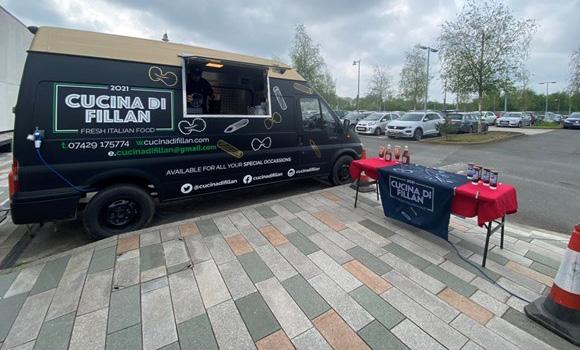
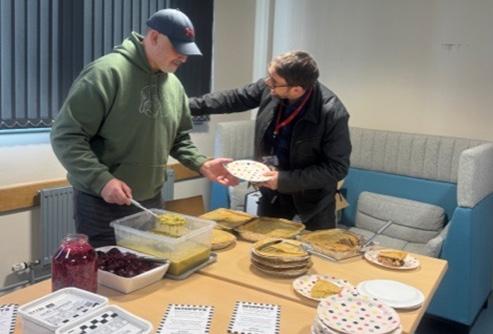
On 30 January, Wythenshawe’s neighbourhood team patrolled the town centre and surrounding areas that members of the public have flagged as having issues.
Work included proactively visiting locations reported to the local team as being hotspots for anti-social behaviour; liaising with local partners, talking to residents, and building intelligence regarding who visits there and when.
During the team’s previous patrols, officers have been able to see where suspected offenders gather, and where they may hide items such as weapons, drugs, or other illicit material.
During the day’s work, and as part of the team’s commitment to protecting businesses and shop workers, a man was detained on suspicion of shoplifting in the town centre.
He was additionally arrested on
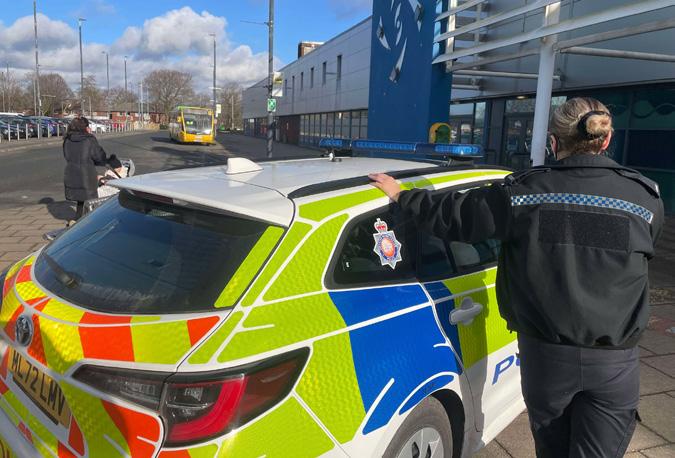
suspicion of possession of cannabis and a public order offence.
Manchester, like every district in GMP, also has its own dedicated shoplifting SPOC, who can share best practice regarding the ways in which to tackle retail crime.
Inspector Bree Lanyon said: “Our neighbourhood team can encounter any and all kind of crimes during their daily work.
“But it isn’t just about tackling crime directly – it’s engaging with our communities, letting people know we’re there, and taking that preventative action to ensure criminals are kept at bay.”